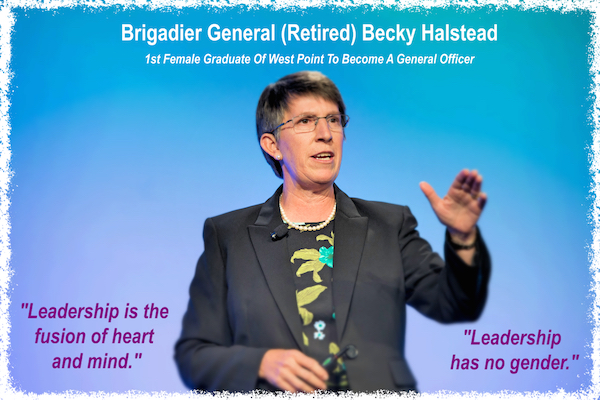Do You Have What It Takes? Developing Key Leadership Principles.
By Brigadier General (Retired) Becky Halstead, Sunday, January 01, 2017
Leaders are defined by their actions and attitudes, especially during volatile times or periods of substantial change. Under pressure, leadership can be eroded by pessimism, lack of clear vision, failure to accept responsibility, or weak communication. The journey to becoming an effective leader, even under fire, begins inside. Before you can effectively lead others, you must commit to lead yourself based on a core set of principles.
1. Practice Discipline
Discipline is perhaps the most important principle of effective leaders. Personal discipline motivates leaders to deal with problems that might be easier to walk away from, control their responses to difficult situations, avoid repeating mistakes, and push through when quitting seems like the best option.
Your true character is who you are when no one else is watching, although in this day and age it seems someone is always watching. Discipline allows you to do what is right whether you are in the public eye or home alone. Discipline is inextricably woven into each leadership principle described here.
2. Be Demanding
At West Point, students follow an honor code, “I will not lie, cheat or steal, nor tolerate those who do.” This code sets the bar high for leading yourself first by being honest and trustworthy. It then sets the bar even higher by requiring that you expect or -- to take it one step further -- demand the same from others. Leading with integrity is critical if you expect to instill high moral standards in the organizations you lead.
3. Lead with Emotion
Emotions allow you to be a caring and charismatic leader, but you must be able to channel emotion or passion into a response that is appropriate to the situation. The heart and mind, working together, serve as the foundation for leadership that incorporates character and competence: to achieve a perfect balance of emotionally empathetic intellect with knowledge-based skills.
Your heart contributes the qualities that come more naturally to you—the expressive impact you have on those you lead. Your mind contributes your skills—the principles and values you master over time. The two merge to sharpen your response to each challenge.
4. Own Your Mistakes
Everyone makes mistakes. In fact, it’s the quickest way to learn a lesson. If you’re a true leader, you demonstrate character by taking responsibility for your mistakes, rather than looking for someone to blame. And you don’t make the same mistake twice. To be an effective, inspirational and influential leader, you must always hold yourself accountable.
5. Build Bridges
A proactive, positive approach to leadership is more about teaching and less about exerting authority. To build bridges with those you wish to lead, extend yourself to others, share, listen, influence and be willing to admit that you aren’t always right or don’t always have all the answers. Many times listening to those who live and work “where the rubber meets the road” provides insight that isn’t always evident at the higher decision-making level. To be an effective leader, you must be open to a collegial exchange of ideas.
6. Be Selfless
This might sound counterintuitive, but people who genuinely focus on others receive much more than they give—personally and professionally. Even when you are busy, it’s important to make yourself available to teach, coach and mentor. As you move up the ranks, your responsibilities become greater, and it becomes easier to put up barriers. Serve others first and check your ego at the door. As Jackie Robinson said, “A life is not important, except in the impact it has on other lives.”
7. Never Give Up
If you quit every time things get tough, you will miss out on wonderful opportunities for yourself, as well as for helping others. Powering through tough times can open doors to incredible adventures, valuable experiences, rich relationships, and rewarding moments of insight. Instead of quitting, make adjustments and know that with each new challenge you will learn more about yourself, gain new resources and knowledge, and come to appreciate life from a different point of view. If in doubt, ask yourself: Will quitting create more opportunities or a better outcome? Minimize your regrets and resolve not to give up.
Developing good leadership skills relies on leading by example, being true to yourself, practicing compassion, and living with discipline and purpose. Lead yourself first to become the type of leader you would most desire to be led by.

Brigadier General Rebecca Halstead
 ExpertiseStrategic level leadership, risk management, diversity and inclusion, coaching and mentoring ExperienceBecky is a 1981 graduate of the United States Military Academy and achieved an historic milestone as the first female graduate of West Point to be promoted to General Officer. She was the senior Commanding General (equivalent to CEO)... Read More +
ExpertiseStrategic level leadership, risk management, diversity and inclusion, coaching and mentoring ExperienceBecky is a 1981 graduate of the United States Military Academy and achieved an historic milestone as the first female graduate of West Point to be promoted to General Officer. She was the senior Commanding General (equivalent to CEO)... Read More +

"Leadership is the fusion of heart and mind."
Brigadier General Rebecca Halstead
More +
"Leadership is the fusion of heart and mind."
More +
"Leadership is the fusion of heart and mind."
Do You Have What It Takes? Developing Key Leadership Principles.





